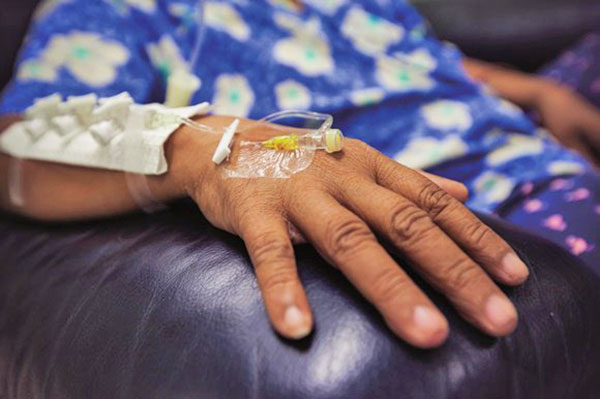|

by Alanna Ketler
May 04, 2018
from
Collective-Evolution Website

Up until recently,
chemotherapy and radiation have been the only two
approved treatment methods for treating cancer by mainstream
medicine.
But as more research emerges, light is being shed on just
how damaging these treatment methods can be and how often they are
the cause of death and not the cancer itself.
Upon this discovery,
many doctors are starting to see how this is not always the best
treatment method.
Researchers from Public Health England and Cancer Research UK
recently performed a groundbreaking study (30-day
Mortality after Systemic Anticancer Treatment for Breast and Lung
Cancer in England - A population-based, observational study),
which examined the number of cancer patients who died within 30 days
of beginning chemotherapy showing how the treatment, and not
the cancer itself, was the cause of death.
When looking at those death rates across hospitals in the U.K., the
researchers found an alarming mortality rate that was directly
associated with the chemotherapy treatment.
"England around 8.4
per cent of patients with lung cancer, and 2.4 per cent of
breast cancer patients died within a month," the Telegraph
reported.
"But in some hospitals the figure was far higher. In Milton
Keynes the death rate for lung cancer treatment was 50.9 per
cent, although it was based on a very small number of patients."
Results of the study
showed the one-month mortality rate at Lancashire Teaching Hospitals
for those undergoing palliative, rather than curative chemotherapy
was 28%.
One in five patients
receiving palliative care for breast cancer at Cambridge University
Hospitals died from treatment.
In other areas including,
-
Blackpool
-
Coventry
-
Derby
-
South Tyneside
-
Surrey
-
Sussex,
...saw that deaths from lung cancer patients
receiving chemotherapy were much higher than the national average.
Cancer Lead for Public Health England, Dr. Jem Rashbass,
requested the study and said, according to the Telegraph:
"Chemotherapy is a
vital part of cancer treatment and is a large reason behind the
improved survival rates over the last four decades."
"However, it is powerful medication with significant side
effects and often getting the balance right on which patients to
treat aggressively can be hard."
"Those hospitals whose death rates are outside the expected
range have had the findings shared with them and we have asked
them to review their practice and data."
"All women with breast cancer and all men and women with lung
cancer residing in England, who were 24 years older and who
started a cycle" of chemotherapy in 2014 were included in the
analysis by the researchers of the study.
Could this
Signify The End of Chemo?
Finally, chemotherapy has been looked at with a skeptical eye, had
this been studied sooner
It is easy to see how this method of
treatment cannot distinguish between healthy cells and cancerous
cells, therefore there are more ideal patients for this method of
treatment and less ideal patients.
The study (30-day
Mortality after Systemic Anticancer Treatment for Breast and Lung
Cancer in England) published by the Lancet shows
how the cell destroying property of chemo can eventually lead to
death as there aren't enough healthy cells to survive.
Because of these important findings, researchers have now advised
physicians to exercise more caution in the process of vetting which
patients should in fact receive chemotherapy and which, ideally
should not.
Older, infirm patients
could potentially be better off without receiving palliative care.
"The statistics don't
suggest bad practice overall but there are some outliers," noted
Professor David Dodwell of the Institute of Oncology at St.
James Hospital in Leeds.
"It could be data problems, and figures skewed because of just a
few deaths, but nevertheless it could also be down to problems
with clinical practice," he continued.
"I think it's important to make patients aware that there are
potentially life threatening downsides to chemotherapy. And
doctors should be more careful about who they treat with
chemotherapy."
It's important to realize
that doctors aren't intending to harm their patients by prescribing
this method of treatment.
This is what they have been taught during
their extensive years of schooling and education, this is the
curriculum, so it's the widely accepted treatment method for cancer
even though it often doesn't help at all and can make things worse
as mentioned above.
The hospitals involved maintain their stance, after reviewing the
information that chemotherapy is 'safe,' with the caveat patient
selection for the treatment should be more discretionary.
Chemo does seem to work
for many, but there is a more ideal patient for this method and it
shouldn't be prescribed to every cancer patient that walks through
the door.
Professor David Cameron of the Edinburgh Cancer Centre at
West General Hospital in Edinburgh, Scotland, noted,
"The concern is that
with some of the patients dying within 30 days of being given
chemo probably shouldn't have been given the chemo.
But how many? There
is no easy way to answer that, but perhaps looking at those
places/hospitals where the death rate was higher might help.
Furthermore, if we
give less chemo then some patients will die because they didn't
get enough chemo.
It's a fine balance and the more data we have
the better we can be t making sure we get the balance right."
U.S. Doctors,
Take Note
Unfortunately, in the United States many patients are forced
to
undergo chemotherapy despite what they want for themselves.
This has
happened with many children whose parents are opting to seek out
alternative cancer treatments.
One example involves,
17-year-old
Cassandra C., who has Hodgkin lymphoma, has
been denied her desire to pursue alternative treatment methods when
it comes to her cancer treatment.
The Connecticut Supreme
Court ruled, on January 8th, that Cassandra (who declined
chemotherapy treatment) will be forced to undergo the treatment
anyway.
She cited chemotherapy's
adverse health effects as her main reason for refusing.
Cassandra expressed that being forced into surgery and chemo has
traumatized her, that it should be a given human right to decide
what you want and don't want for your own body.
Alternatives?
The most frustrating part about this whole thing is that
there are in fact many alternative methods
to treating cancer that are not recognized, accepted or provided
with enough funding for thorough studies to be considered as an
option in the first place.
Successful alternative methods that have been used to treat cancer
is an entirely separate topic that involves a lot of research, but
success has been reported using vegan methods, fasting methods, and
more.
Clinical trials have been
conducted in these areas, but we don't hear much about it. The
science on this that's emerging is fascinating, and we encourage all
who are interested to look into it a little deeper if interested.
Below is a great clip from
The THRIVE movement that gives us all
something to thing about.
|


